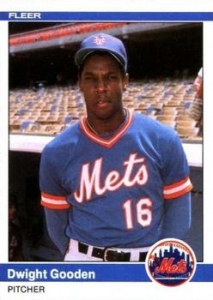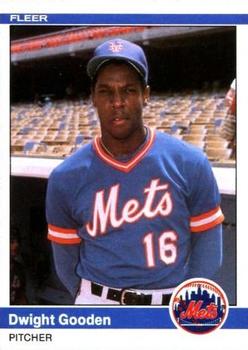September 17, 1984: Dwight Gooden strikes out 16, but Mets lose to Phillies
 Sometimes, you just can’t win for losing.
Sometimes, you just can’t win for losing.
Dwight Gooden’s eighth-inning balk gave the Philadelphia Phillies the go-ahead run and marred an exemplary performance on September 17, 1984. It was an awful way to lose a ballgame, especially when the rookie hurler had 16 strikeouts and allowed no walks.
For the 20,483 attendees trekking through the Veterans Stadium concourse on a Monday evening to get to their seats, it was an opportunity to watch greatness. The 19-year-old right-handed fireballer did not disappoint, though Mets fans would certainly have welcomed an entry in the “W” column to accompany an outstanding evening on the mound. In Gooden’s last outing before this one, on September 12, he broke the major-league season record for strikeouts by a rookie.
It seemed that Gooden’s fastballs had the force of proton streams from the Proton Packs in the year’s blockbuster film Ghostbusters. He tallied three strikeouts in the bottom of the first inning after Jeff Stone began the Phillies offense with a single and a stolen base. The next two whiffs came in the second inning and another two in the third.
Then the Phillies presented a bit of worry for Gooden and the Mets. Von Hayes, the home team’s leading hitter in 1984 with a .292 average, knocked a one-out single in the bottom of the fourth; Gooden’s balk sent him to second base. Philadelphia’s swift-footed runner moved 90 feet closer to home plate by stealing third. It was not unexpected; Hayes was successful on 48 of 61 steal attempts in 1984.
Mike Schmidt struck out for the second time, becoming Gooden’s eighth “K” in the Philadelphia night; Tim Corcoran’s fly out to Mookie Wilson in center field lowered the blood pressure of the Mets faithful.
Mets shortstop Hubie Brooks got the first hit for the visiting squad with a single in the top of the fifth. Gooden added three more strikeouts in the bottom half, giving Mets fans visions of shutting out the NL East rivals.
It was a scoreless game through 5½ innings. But a combination of errors gave the Phillies a 1-0 lead in the bottom of the sixth.
Gooden’s dominance continued with his second strikeout of Stone. But his batterymate, Mike Fitzgerald, missed the third strike for a passed ball, which gave Stone the opportunity to sprint to first base, where he then notched a stolen base. It was a likely scenario. Philadelphia’s rookie left fielder stole 27 bases and was caught only five times in 1984.
Stone’s journey didn’t stop there – Gooden’s error while trying to pick him off second ignited a scamper to third base.
Juan Samuel’s strikeout gave Gooden a breather, but only for a moment. Hayes’s foul ball looked like the final out; Mets third baseman Ray Knight dropped it; and Hayes took advantage with a single to score Stone, giving Philadelphia a 1-0 lead.
Schmidt strode to the batter’s box with a body of work that increased the trepidation for Mets fans. Philadelphia’s veteran slugger was a six-time major-league leader in home runs. He ended 1984 with the top NL slot at 36 homers.
Gooden retired the cleanup hitter on a fly to Wilson. He followed with a redemption of sorts, picking off Hayes.
New York evened the score in the top of the seventh with George Foster’s solo home run.
In the bottom of the seventh, Corcoran led off with a single. Iván de Jésus pinch-ran but had a short-lived experience on the basepaths – Fitzgerald threw him out when he tried to steal second. Second-base umpire Harry Wendelstedt had initially called de Jésus safe because he didn’t see that Brooks had snared the sphere.
Infernal verbosity followed.
With the passion of a Philadelphia defense lawyer representing a client on a charge of murder in the first degree, Phillies skipper Paul Owens argued that de Jésus was safe. His arguments failed to persuade Wendelstedt, who tossed Owens from the game.
The umpire explained, “I realized I called it too quickly when I saw the ball in the glove and the runner standing on it. I was going to get the play right, and I reversed my call. “I’ve got to be honest with myself.”1
Ozzie Virgil struck out for the third time and Greg Gross’s liner to Brooks sent the Phillies back to the field.
In the bottom of the eighth, Philadelphia scored its second run.
It looked promising for the Mets when Gooden struck out pinch-hitter Al Oliver, batting for Steve Jeltz. But pitcher Shane Rawley singled and took second when Gooden threw one of his three wild pitches in ’84. Stone singled, and Rawley stopped at third.
Philadelphia had runners at first and third with one out for Samuel. Stone stole second to give the Phillies two runners in scoring position. Then came the game’s deciding play. Gooden’s second balk of the night sent Rawley across home plate. The Phillies had gone ahead again, 2-1.
Mets first baseman Keith Hernandez took the blame for the rookie pitcher after the game. “I screwed up,” explained Hernandez. “We had just had a meeting on the mound, and it was the last thing in my mind that he’d wind up. I yelled, ‘Step off,’ and he did. If I’d done it a split-second sooner, he wouldn’t have balked.”2
Gooden racked up seven balks in his rookie season.
Gooden whiffed Samuel for the third time and fielded Hayes’s grounder to stem any further damage, but the Phillies had the lead to stay.
Rawley closed out the Mets in the ninth to complete an impressive outing, scattering five hits and allowing one walk. Mets leadoff hitter Wilson went 0-for-4; Kelvin Chapman accounted for two of the Philly southpaw’s three strikeouts. The Yankees had traded Rawley to the Phillies in June, after a 2-3 record in 11 games. With his new team, he compiled a 10-6 record.
Gooden’s recent outings had signaled a tough night for the Phillies. Rawley explained, “I knew [Gooden] was coming in with two straight shutouts [and seven straight victories], so I had to be ready. I knew I was in for a good game because he’s been pitching as good lately as anybody ever had thrown. I felt I had to be at my best and I really felt I was going to beat him.”3
New York’s loss preceded an 8-3 run for the rest of the ’84 campaign, which ended with a 90-72 record and a welcome sense of rebounding. Since 1977, the team had not won more than 68 wins in any season.
Philadelphia did not fare as well. Not even close. The City of Brotherly Love lamented a 1-10 record for their beloved team’s remainder of the 1984 NL campaign. The Phillies ended the season’s chronicles with an 81-81 showing, a disappointing finish after winning the NL pennant in 1983.
Gooden’s effort tied him with Luis Tiant and Nolan Ryan for the major-league record of 32 strikeouts in two straight games. The right-hander said that he wasn’t aware of the achievement. “But I’d give up the records just to win.”4
1984 NL Rookie of the Year honors went to Gooden, who led the major leagues with 276 strikeouts. His exploits on the mound led to a 17-9 record and 2.60 ERA.
Acknowledgments
This article was fact-checked by Thomas J. Brown Jr. and copy-edited by Len Levin.
Sources
In addition to the sources cited in the Notes below, the author consulted Baseball-Reference.com and Retrosheet.org for pertinent information, including the box score and play-by-play.
https://www.baseball-reference.com/boxes/PHI/PHI198409170.shtml
https://www.retrosheet.org/boxesetc/1984/B09170PHI1984.htm
Notes
1 Peter Pascarelli, “Mets’ Gooden Strikes Out 16 but Loses,” Philadelphia Inquirer, September 18, 1984: 1E.
2 Joseph Durso, “Gooden Fans 16 in Eight but Loses Game on Balk,” New York Times, September 18, 1984: B11.
3 Ray Finocchiaro, “Rookie’s balk forces home winning run in 8th,” Wilmington (Delaware) Morning News, September 18, 1984: C1.
4 Durso.
Additional Stats
Philadelphia Phillies 2
New York Mets 1
Veterans Stadium
Philadelphia, PA
Box Score + PBP:
Corrections? Additions?
If you can help us improve this game story, contact us.


